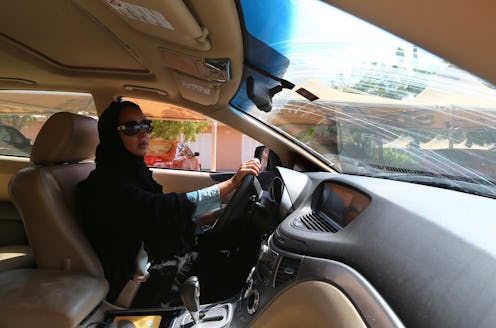News
Uber Partners With The UN To Create Female Jobs
In an effort to repair some of its negative PR over the last year, ride-sharing company Uber is partnering with UN Women to provide jobs for women around the globe. Uber made the announcement on Tuesday in honor of the 20th anniversary of the Beijing Declaration, a U.N. provision that promised global gender equality. The company hopes to secure 1 million positions for women by 2020 — a lofty but commendable goal that Uber hopes will foster economic growth for women worldwide.
Called "Step It Up For Gender Equality," the new partnership will mobilize women in local communities by employing them as Uber drivers. UN Women Executive Director Phumzile Mlambo-Ngcuka and Uber CEO Travis Kalanick said in a joint statement on Tuesday:
We intend to invest in long-term programs in local communities where we live and work, as Uber commits to creating 1,000,000 jobs for women globally on the Uber platform by 2020. ...
This important mission can only be accomplished when all women have direct access to safe and equitable earning opportunities. We look forward to a partnership where UN Women and Uber will drive more access to these types of opportunities around the world.
In an interview with BuzzFeed News, Uber general counsel Salle Yoo said the company will meet with officials from the United Nations' women's arm over the next few weeks to talk about "the most innovative ways" to create jobs for women. "We are going to collaborate with them and we are going to learn from them," Yoo told BuzzFeed News. "They will teach us how to get our message out there."
Of course, these positions will only be available in countries where there's both an Uber and UN Women presence. Currently, Uber is located in 55 countries, while UN Women, which is headquartered in New York, operates programs and offices in 48 countries worldwide. Uber and UN Women have yet to release information on where most of these new jobs for women will be located, or where Uber can make its biggest impact for women's economic growth.
Although Uber's popularity has soared since it began in 2009, the ride-sharing company has taken several hits over the last year that call into question Uber's commitment to protecting its female passengers. Incidences of sexual violence have been reported from New England to India. Just a few months ago, Boston police had to issue a warning to women who prefer to travel by Uber, advising them to stay alert after a 46-year-old Uber driver was charged with raping a female passenger.
In India, where the company's background checks of drivers were much more loose, an Uber driver in New Delhi was arrested for raping a 26-year-old woman after driving her off-route to a secluded location in December 2014. The local government banned Uber from operating in the city for six weeks.
The tragic rape in New Delhi led to Uber India introducing the "panic button," which will allow female passengers to alert local police departments if there's danger or threat of an attack. The "panic button" is just one of several new safety features that Uber India recently rolled out to better its image and show that the company cares about its female passengers. However, Uber has yet to release a feature similar to the "panic button" outside of India.
Images: Getty Images (2)
